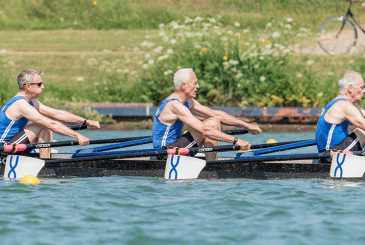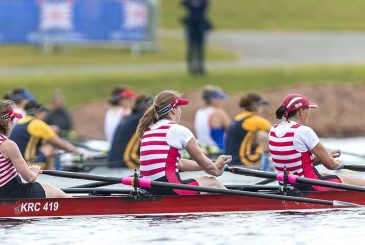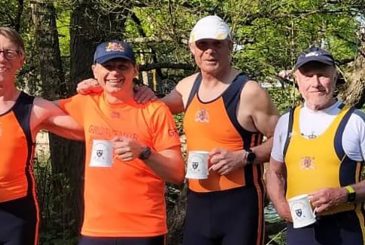Rowing is a great sport for all ages – and a strategic approach to good health will mean older rowers can continue to enjoy the sport. Zoe Gullen finds out more
Combining cardiovascular fitness and strength work, rowing is a full-body, low-impact exercise, and brings far-reaching benefits that very few other sports can match.
Rosie Mayglothling, British Rowing’s former Director of Pathway Development, says: “Rowing is one of the few sitting-down sports, so there is not the pounding you get in sports involving running. This is why it’s also good for older people, and you can keep rowing into your nineties.”
But it can also be demanding, so it’s vital to keep on top of health and wellbeing.
As Rosie says: “As you get older, you need to take more care of your body. Core and stretching become a necessity, and taking longer between training sessions for recovery, as well as stopping if you get an injury and illness and not just carrying on.”
A conscious, strategic approach to good health will mean masters can continue to enjoy rowing, and achieve their aims, for many years to come.
“We need to remember how old we are, not how old we feel!”
Jeremy Perkins, a GP and active member of Grosvenor Rowing Club in Chester, agrees. He says that there can be a tendency, especially for those who are reasonably fit and healthy, to feel younger than their true age, but it’s important to warm up thoroughly and make time for a proper cool-down after sessions. When beginning any new exercise, it’s important to start cautiously, even if it seems very light or easy, to stay in good health and try to keep injuries at bay.
He advises: “Start slow, enjoy it and build up, as improvements will come with time. We need to remember how old we are, not how old we feel!”
Helen Dodsworth, a member of Broxbourne’s successful masters women’s squad, says: “I think rowing is a great full-body workout. What is so good is the low-impact aspect: all the high-impact or running-type sports are hard to continue as knee and ankle injuries start to crop up.”
For Helen, who was a successful junior before taking a break from the sport and then returning in her forties, competition is also a significant part of the sport, for both mental and physical benefits.
“I was making sourdough before it was trendy!”
She says: “There is a great social and team aspect to being in a boat and moving together with others. Competing can be stressful, but that also it makes it exhilarating. You can – and should push – yourself to work harder and get stronger.”

These aims are supported by the club through coaching and a pathway for athletes of all ages to achieve their goals, taking masters athletes seriously and not, as Helen puts it, “just some old birds who are out for a pootle!” And there are wider health benefits for the next generation too: “I think it’s really important for mothers to stay with their sports, to model that behaviour for their children, especially the girls, and to have that time for themselves.”

Like Helen, Brian Humphris of Ardingly returned to rowing after a break: at 40, his doctors told him to change his lifestyle, so he “hopped on an erg to lose weight”. This led to more serious on-water training over the past decade, with wins at national-level masters events. Brian then used the long fallow period of the pandemic and lockdowns to review his approach to rowing.
“I took a long look at health and fitness, food intake, what I was drinking, started daily morning yoga and maintaining my fitness base. This probably made me a different sort of trainer, and I’m physically better off.”

Pictured above, he subscribes to the idea of maintaining a ‘fitness bubble’, then ‘bouncing’ up to race speed: “the bigger your fitness bubble, the easier it is to do that”. Creating the bubble involves a strategic approach to training.
“It’s not jumping on the erg every day – I make sure I do some cycling. Even just mobilising your body for 30 minutes a day is beneficial.”
“You hop on the water, have a good session and get mentally cleansed”
Alongside this is what Brian terms a ‘health mindset’, making small but positive changes such as taking the stairs not the lift and good nutrition and gut health – he says: “I was making sourdough before it was trendy!”
This health mindset encompasses mental as much as physical health, and exercise is key to managing stress, as Jeremy explains.
“The benefits of exercise are massive, and I’m really passionate about that. It can be the easiest thing to drop when we’re busy. Work takes over the headspace and it becomes a vicious circle. But, from personal experience, the busier I am the more important it is to make time for something I love.”
And it doesn’t need to be a long training session: “Just 20 or 30 minutes. Ergs are very efficient, and you can do a good workout even in 10 minutes.”
Then there are the proven benefits from exercising outdoors. Brian says: “You hop on the water, have a good session and get mentally cleansed.”
Helen adds: “I am convinced that getting outdoors – in all weathers – is good for mental health, which is something I probably wouldn’t have considered when I was younger.”
At Camrowers, a recreational club founded in 2001 as part of a GP referral scheme, the focus is on fitness and enjoyment for members ranging from their forties to their nineties, many of whom learnt to row at the club.

Lesley Noblett, a member of the Cambridge-based club, says: “We come to enjoy the exercise, the opportunity to get out onto the River Cam, which takes us out into the countryside, and – very importantly – to meet up with each other, not only to row, but to socialise.”
The social element builds a sense of community both on and off the water, and there is a boost from learning new skills.
Rosie recalls: “Many years ago I was coaching a group and told them they all had to row in singles. I remember the outcry, but they all really enjoyed it once they realised that individually they progressed quite quickly, and they could have fun training and racing and pushing each other. This wasn’t always measured by who could go the fastest, but by such activities as who could go the fastest between strokes.”
Lesley concurs: “It’s a real achievement when you had previously imagined rowing was only a sport for youngsters.”

Camrowers works hard to support its members, to improve access and reduce barriers to participation, and make sure all members can take part confidently and safely.
Lesley says: “Our sessions are overseen by trained volunteers and we have a very strong team of coaches who not only teach people to row, but continue to help them improve or adjust their skills. We have a very modern fleet of stable sculls, which suits us really well and we can add stabilisers for some learners or for those who continue to need a bit more support.”
This fantastic support, and a good health mindset, can help rowers of all ages thrive for many years to come.
Photos: Thanks to the rowers and also Ben Rodford (main photo)










